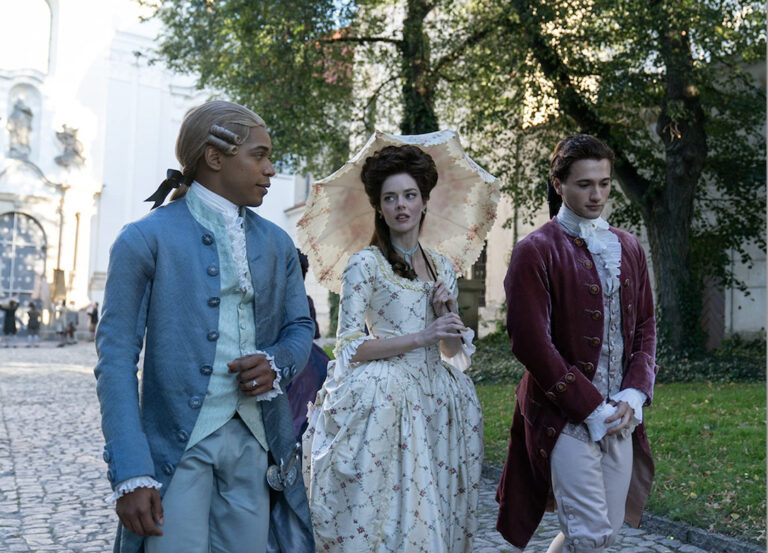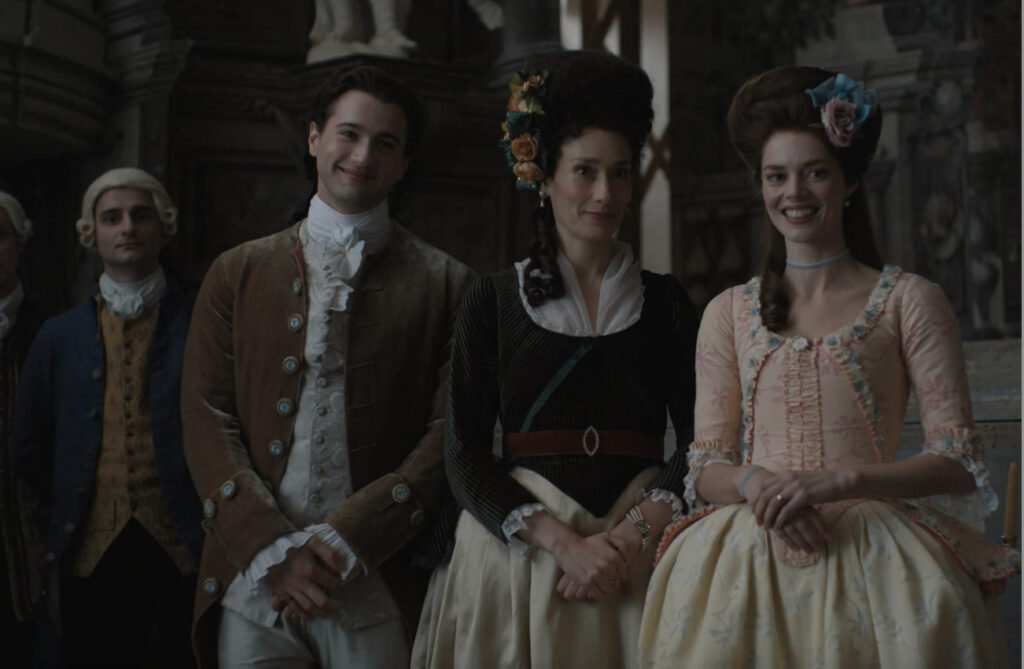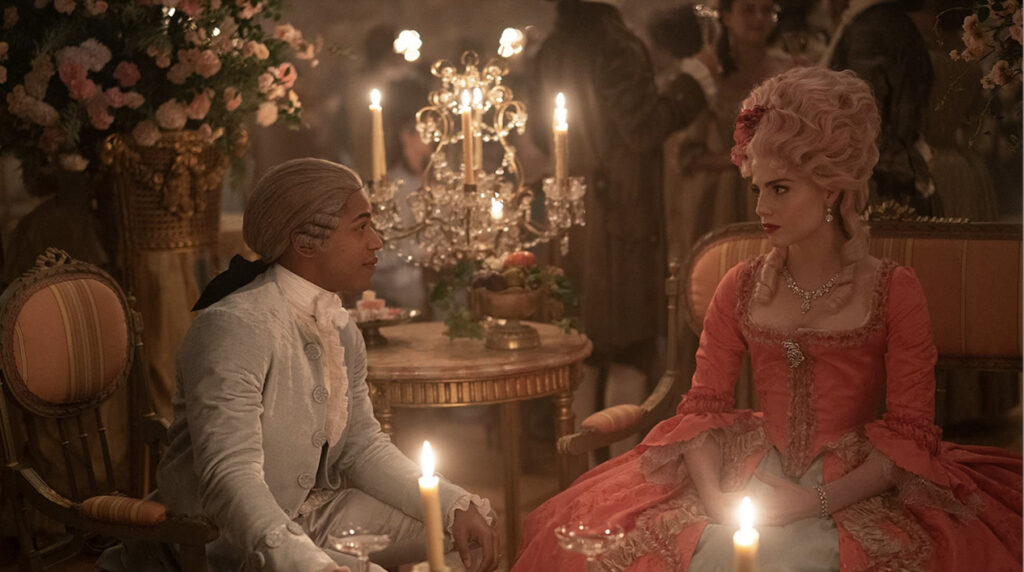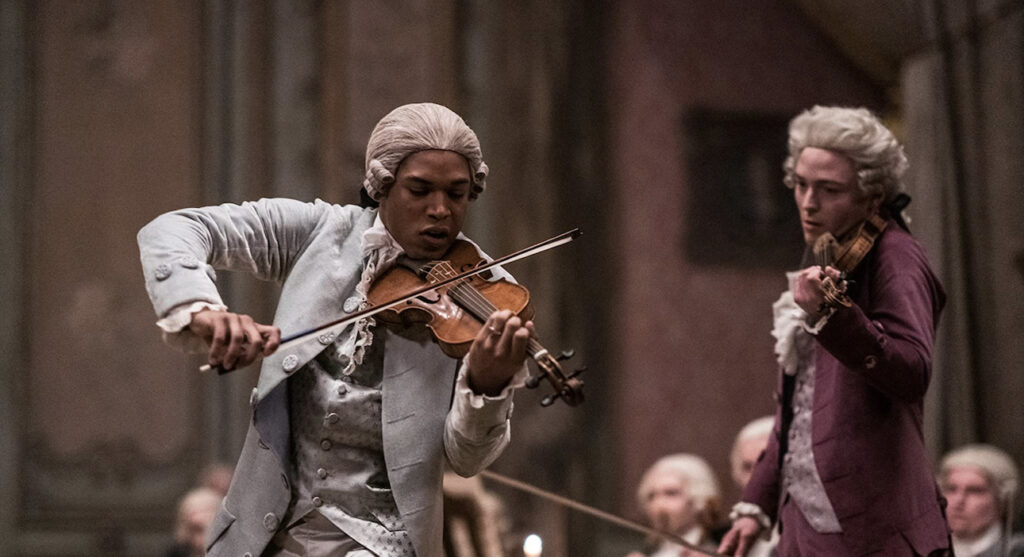
Synopsis : Inspired by the incredible true story of composer Joseph Bologne, Chevalier de Saint-Georges. The illegitimate son of an African slave and a French plantation owner, Bologne (Kelvin Harrison Jr. in a tour de force performance) rises to improbable heights in French society as a celebrated violinist-composer and fencer, complete with an ill-fated love affair and a falling out with Marie Antoinette (Lucy Boynton) and her court.
Rating: PG-13 (Thematic Content|Suggestive Material|Some Strong Language|Violence)
Genre: Biography, History, Drama, Music
Original Language: English
Director: Stephen Williams
Producer: Ed Guiney, Andrew Lowe, Dianne McGuigle, Stephani Robinson
Writer: Stephani Robinson
Release Date (Theaters): Wide
Runtime:
Distributor: Searchlight Pictures
Production Co: Stillking Films, Searchlight Pictures, Element Pictures

Exclusive Interview with Actress Samara Weaving
Q: Joseph Bologne is incredibly well educated in a way that got transgressive, like Prince or David Bowie in this era, but most of the people don’t know about him. What was your fascination about him during the research process?
S.W: I was just fascinated that I didn’t know who he was. I thought that was really bizarre and strange, and I wanted to make sure that as many people as possible could learn about him.
I just thought he was such a fascinating character and I think we should teach about him in schools.
Q: Your character, Mary Josephine, is a real-life opera singer, but are there a lot of written material? What kind of research did you incorporate into your character?
S.W: It was hard to research, there wasn’t a lot on her. There was a lot on her husband. Really, I utilized Stefani Robinson, the writer, because she had done a lot of research and knew things that I couldn’t really find. So, she was really my resource.
And we talked a lot about the living situation she’d be in and what she did, and really how actions shaped the character.
Q: Even though this is a Joseph Bologne story, what’s amazing is the script of Stefani Robinson, that really captured the sensitivity and warmth of it, and the perspective of Joseph Bologne. What was your impression of the script that fascinated you about Stefani’s writing?
S.W: I think she just captured really well-rounded characters. I think it would be easy, especially in a period piece, to go into some of the cliches of those period dramas, but she just really wasn’t a damsel in distress at all. She could really hold her own and speak up. And I love that scene in the part where she got on the table and skulled a beer and said, “what about women?” I love that. And I thought that that was really powerful.

Q: I heard that Kelvin did like six months of training for brain wiring, but what kind of rigorous training did this process bring up for you? And I heard that Minnie Driver has prior experience with singing, but what kind of preparation did you do?
S.W: I had a fabulous singing teacher, Michael Robbins, and we worked together for a few months before filming, and he was wonderful and patient and very kind.
Q: And what kind of training is it, is it purely vocal?
S.W: He taught me how opera singers really need a lot of breathwork, and we were given the two songs, the two arias that Marie Josephine sings and the beautiful composers who helped with us too. And we just rehearsed and practiced them sort of line by line until I could carry it somewhat gracefully.
Q: Could you talk about collaboration with the director, Stephen Williams, someone who has this bird’s eye view of looking at things throughout the scenes, and you can feel that in the film. What was the fascination about his direction, and does it differ from other directors that you’ve worked with?
S.W: He was great, he had such a specific vision that was really interesting. He really had it in his head what he wanted and that was really great because I put all my trust into him. Also, the cast was so brilliant and it just felt very easy, especially with Stephanie’s writing. It made my job really easy.
Q: What kind of research process did you do with other actors, like Minnie Driver and others, because this movie relies very much on the music. So, talk about working with other actors when it comes to music.
S.W: I really just worked with Kelvin, but essentially, I don’t know about the other actors, but for me I would work alone with Michael and then we’d come to set. I think because Calvin’s schedule was so mental, we couldn’t really rehearse that often. But I would go and work alone, then we’d come to set, and we’d put it together. I mean the composers and Stephen’s really intense idea for it just came together really well.

Q: Could you take us through your casting process? How did you get cast on this one? Because obviously you have a track record of really great movies in the past, but what was the particular thing they saw in you to cast you on this one?
S.W: I read Stefani’s script like a year into the pandemic, and then I met with Stephen a year after almost. And we talked a lot about the role and about the film and what it means, and the responsibility of taking on something like this. I was just very lucky and very grateful that they wanted me to be a part of it.
Q: Are there any challenges that you guys faced during the COVID-19 pandemic, and what was the process like shooting period pieces during Covid because it requires a lot of costuming and makeup, so talk us through the challenge of shooting.
S.W: I mean, we had a great Covid team on set and we got tested a lot. Luckily, it was towards the end, so we were all vaccinated. I don’t think anyone got sick. Maybe some crew members, but I don’t think any cast got sick. Or at least I wasn’t aware of it. Yeah, we just made sure that we quarantined and stayed safe. And if we hung out, we hung out mainly outdoors. But again, I think a lot of people were stressed, they just kept it from us and did their jobs very well. We weren’t the ones that had to be stressed out about it.
Q: This film was presented at the Toronto Film Festival, and I heard that it got quite a good reaction. Talk about being there with all those audiences, and showing this movie where most people don’t know about Joseph Bologne.
S.W: I love the Toronto Film Festival, I think it’s a really cool festival. The audience seemed to love it, and Kelvin got a huge standing ovation which was very exciting. It was good. I love doing press like this. It’s so good to see everyone and I’m excited for the world premiere so I can go and hug and make out with everyone again.
Q: Joseph was vastly known as a composer, but what’s interesting about him is his transitional period – to go from music and playing in front of the Queen to actually being the soldier who led soldiers against the monarchy. So, talk about your fascination with his transitional period.
S.W: Yeah, I think that’s what made him such an interesting character and Stefani really captured the sense that this isn’t someone who is like an artist and activist today. This is someone who could get killed for saying these things back then, and making a change was super risky in the Western world back then. I think that’s what just made him so incredible, that he went through such hardships but still stuck to what he believed in and didn’t accept. The reality that he didn’t accept things that he found unacceptable, and he wanted to change them.
Check out more of Nobuhiro’s articles.
Here’s the trailer of the film.

